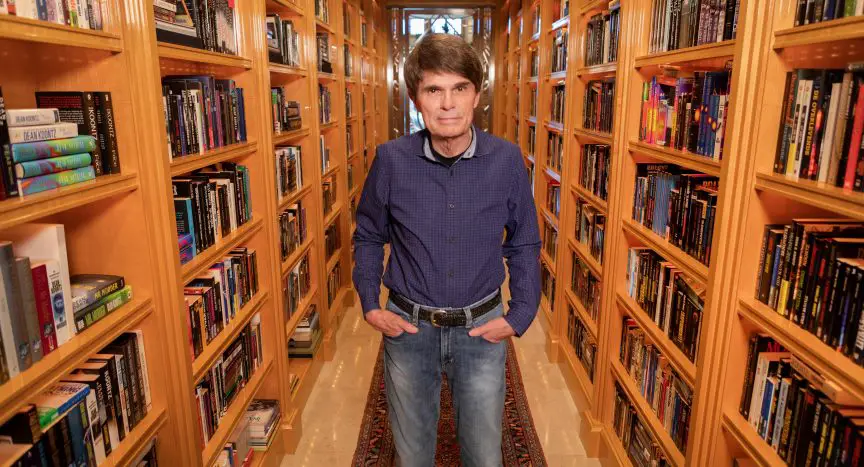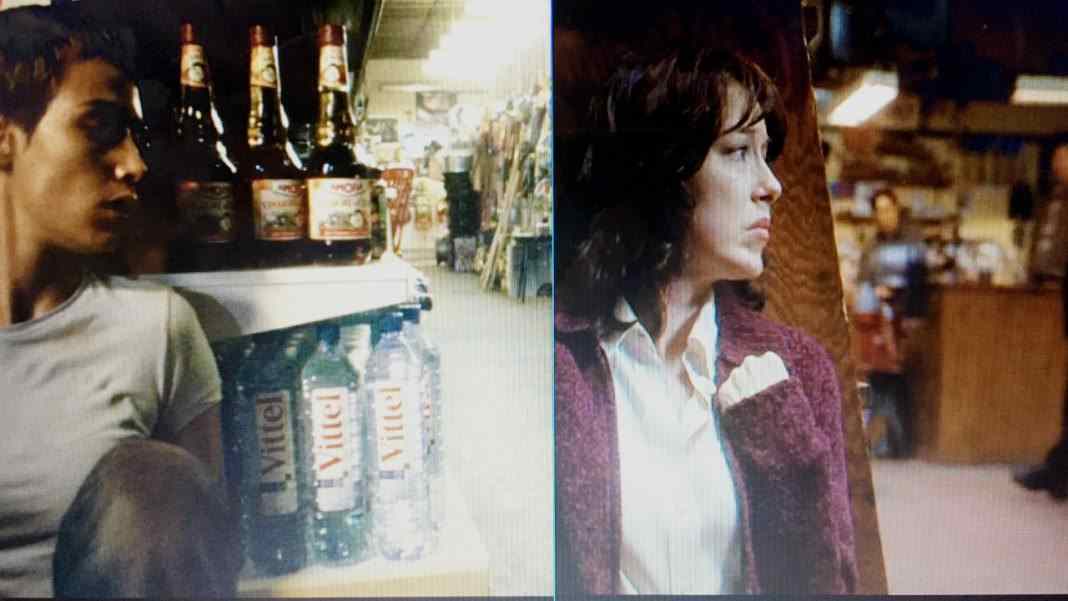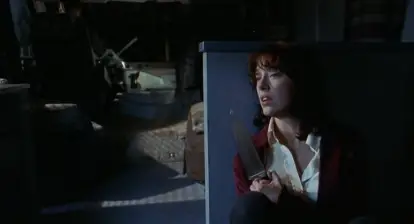Welcome back to Written in Blood, an interview series featuring novelists and screenwriters in the horror genre.
Dean Koontz has some advice for aspiring writers: “Never name a serial killer Pinkie or Fuzzball unless you’re a really, really, really damn good writer.” It’s a comical tip, but one whose humor is rooted in craft. After all, names and backstories that explain sociopathic characters’ reasons for villainy can be tricky. “This can develop a certain degree of the reader’s pity for the villain, but it shouldn’t induce sympathy, which is a much different emotion. If you feel sympathy with a villain, he’s not evil—or maybe you are.”
After writing fan-favorite novels like Phantoms, Lightning, Odd Thomas, and more than 100 others over 50 years, it’s safe to say that Koontz knows a little about evil—both fictional and real. From the narcissistic and murderous tendencies of The Big Dark Sky’s Asher Optime to the deceit of one of Koontz’s own literary agents, Koontz has managed to utilize the concept of villainy (and those rallying against it) to become one of the most prolific genre writers working today. And having sold over five hundred million books worldwide, it seems to be working.
The Pennsylvania native’s latest novel, The Big Dark Sky (released today, Thomas & Mercer), is another winner. It’s a tale of a group of seemingly unrelated people drawn towards an ominous Montana ranch by synchronicities—amazing coincidences that serve a greater, unknown purpose—to defeat a malevolent threat. Not only does it feature incredibly compelling characters and a strong sense of place, the climactic tale of good vs. evil beautifully revels in the wonder that exists in the seemingly ordinary events all around us.
In advance of its publication, I sat down with Koontz for a wide-ranging chat about his dedication to craft, finding sanctuary in libraries, the secret to creating a memorable (and chilling) villain, why he infuses his novels with optimism, his experiences in Hollywood, which of his characters he’d be afraid to meet, and more.
Wicked Horror: I hated reading until 7th grade when I found books that I was interested in rather than being told what to read. Were you always a voracious reader, or did you have to wait for the right book to spark your love?
Dean Koontz: I was raised in poverty, under the threat of violence, and books were my escape. I was into books by the time I was eight, and by the time I was twelve, I’d read everything our county library had in the children’s and young adult’s sections. In those days, you needed to be 18 to take books out of the adult section, but the librarian befriended me and opened the gates. Soon I was reading everything from Dracula to The Caine Mutiny, but with an emphasis on science fiction. When Gerda and I were first married, we went years without a TV (initially, we couldn’t afford one, and then we didn’t want one), and for at least at decade, we each read about 200 books a year. So I packed my brain full of literally thousands of novels. What I do have in common with what you said is that I never much liked what school curricula forced on me, and I avoided it. Although later in life I became a Dickens fan, I never will be a fan of Silas Marner!
Did You Know? Wicked Horror TV Has Classic and Independent Horror Films Available to Stream for Free!

WH: The Big Dark Sky deals with the concept of synchronicity—the amazing connectedness between seemingly unrelated events—and characters who find that tragedy often leads them to a greater purpose. Between dropping literary representatives who haven’t believed in your work, to being without an agent for 14 years, you’ve had some unfortunate circumstances that have arguably led to bigger and better things. Do you see these as examples of synchronicity in your own life?
Dean Koontz: If I write a memoir of my career, it’ll be packed with instances of amazing coincidences, synchronicities like the real-life ones I refer to in the novel, but also with examples of my stupidities (how naïve I was!), some publishers’ bizarre decisions, deceit and treachery by an agent as my career was finally taking off—but also acts of kindness and support. I never received the marketing that has built many writers into bestsellers, none of what they called “showrooming” and other arrangements with booksellers. In fact, at one point, even after I’d had number one bestsellers, the only way I could force serious advertising was to contribute significant sums to the ad budget. Based on how that worked out, I don’t recommend it! But time after time, when it seemed I’d been pushed off a cliff by one policy or another, sales either didn’t fall or spiked. Which is why I tell young writers that persistence is key. Persistence and a talent for feel-good self-delusion. Persistence and a talent for feel-good self-delusion and a reasonable quantity of alcohol.
WH: Your output is consistently (and impressively) prolific. Do you tend to have several ideas percolating at once and have to choose which to write next, or did The Big Dark Sky “call” to you over others?
Dean Koontz: I always have more ideas than time to write them. When I finish a book, I move next to whatever story seems most compelling to me at that moment. Now and then it’s one I’ve been thinking about for some time (I first thought about a novel exploring synchronicity 40 years ago!), but more often it’s a new idea that occurred to me as I was writing the novel I just finished.

WH: You’ve crafted a fantastic and terrifying central villain in Asher Optime. He’s especially horrible because he believes so deeply that his actions and beliefs are righteous. What’s the special sauce to creating a memorable villain?
Dean Koontz: Self-righteous ideological narcissists with a tendency to psychopathy are the most terrifying of all. And the world we’re living in now is full of them! But as deeply evil as Optime is, he’s also amusing, though he’s not aware of it. I never want a villain to be glamorous, to inspire anyone. If I write the character as a person who lacks self-awareness, if we can laugh at him even as he scares the bejesus out of us, there’s no danger that I’ll fall into the moral error by making him glamorous.
Be extremely cautious about childhood trauma and social injustice and that kind of thing when trying to explain a full-blown sociopath. Sociopaths come from every strata of society, every race and every economic background; all evidence suggests they’re born, not made.
WH: In many of your books, the forces of good and optimism tend to overpower those of evil and negativity, especially in The Big Dark Sky. Is this something that’s intentional that reflects your own positive outlook, or do you just go where the story takes you?
Dean Koontz: The Big Dark Sky has a development at the end that’s sort of a last twist of the knife, even though the book is overall optimistic. I am an optimistic realist, not one of the misanthropic legions you see these days. That means if I were to write a book so dark that it offers no hope, I would be writing what I know in my heart to be a lie. No point in that.

WH: You’ve often shared that you tend to re-write each page dozens of times. Is the drafting and re-writing process something that you enjoy, or a necessary evil to turn in polished prose?
Dean Koontz: I love it. English is a beautiful and supple language, and shaping it as best I can involves profound satisfaction. We’re only here for a short time, and it seems to me there’s no point using our time to do less than we’re capable of doing. I wasted my early years in just that kind of thinking.
WH: I got a kick out of Kenny in The Big Dark Sky listening to ‘60s on 6 on SiriusXM (which is one of my favorite stations). Do you listen to music while you write?
Dean Koontz: When I listen to music, it has to be something with which I’m so familiar that it doesn’t distract me. I’ve been known to put on the same album and play only that, over and over again for months: Paul Simon, Arthur Rubinstein playing Brahms, whatever seems to support the mood of the story on which I’m working. I have discovered that bongo drums are a bad idea, as they lead to manuscripts in which all the sentences are very short and equally emphatic.
WH: Rather than outlining your stories, you like to let the characters “take over”. Where’s the strangest or most exhilarating place they’ve taken you—or plot development that has occurred—because of this process?
Dean Koontz: So many wonderful, surprising things have happened since I began to give characters free will that I could write a long book about them. One that comes to mind occurred when I was in the opening sequence of Life Expectancy. I knew that the most motive antagonist of the story would be a man that the father (Rudy Tock) of our protagonist, Jimmy Tock, met in the expectant-father’s lounge on the night Jimmy was born. The scene was going along swimmingly, even though I didn’t yet know who the bad guy would be. Suddenly, after describing how such lounges looked in the 1980s, I found myself writing the following: “The chain-smoking clown didn’t improve the ambience.” I stopped dead. Clown? My villain could not be a clown. That was too absurd. What was Rudy Tock thinking? By this point, I had long given characters free will, and after fifteen minutes of anguishing about it, I decided to trust Rudy. Life Expectancy racked up scores of lovely reviews, generated almost as much mail as Odd Thomas, sold superbly, and became one of my favorites of my own work. But if that character had not been a clown, the entire book would not have worked. Thank you. Rudy Tock.

WH: When it comes to responding to editors’ notes, you’re a proponent of manuscript changes for “the right reasons.” Have you ever gotten a note back from an agent or editor that you felt averse to incorporating and had to defend your decision?
Dean Koontz: Oh, yes. Many times. You have to do so with respect, and you have to be able to justify your decision by showing not only how the change would adversely affect the plot but also the character(s), themes, and subtextual approaches you’ve taken to support those themes. I very much liked Sonny Mehta, at Knopf, a charming and very intelligent gentleman, but the suggestions I got for Intensity would have destroyed the book. I had to resist them. Strangely, Sonny thought the book moved “too fast” but also that it was an “Avant Garde” work that readers of popular fiction would reject. They didn’t reject it. That experience confirmed for me something I’d suspected for a few years: that many publishers in New York greatly underestimate the brainpower of the reading public and think they have to “publish down” to the great unwashed.
Also See: Did ‘High Tension’ Copy Dean Koontz’s ‘Intensity’?
WH: Let’s talk about writer’s guilt. I feel like writers are unique in that we’re harder on ourselves than any other profession—almost like we don’t deserve success if we’re not spending every waking moment in front of the laptop screen. Why is that? What’s a healthy balance of holding ourselves accountable for our output while also giving ourselves permission for downtime?
Dean Koontz: I have no idea. I have interests other than writing, but I put in 60- and 70-hour weeks at the work, and no matter what else I’m doing, the issues related to the current novel are always at the back of my mind. The work is an obsession or it’s not, and whether or not it’s an obsession is largely beyond the control of the writer.
WH: Your books (and Twitter feed) often feature a heavy dose of humor. In my experience, horror writers are funnier and more playful than those working in any other genre. Is it needed to balance the dark with the light?
Dean Koontz: Actually, I think there’s a lot more humor in the mystery genre, where it’s had a long tradition. Horror has yet to produce a comic genius like Donald Westlake. When I left science fiction in the early 1970s, one of the first things I wrote was a comic novel, Hanging On, so that urge was always there. This world is achingly beautiful but also dark, and the way we get through the darkness is with humor. Knock-knock jokes, squirting lapel flowers, puddles of plastic vomit, and that kind of thing.
WH: More than a few of your stories have received the Hollywood treatment. Do you like to serve in a hands-on role in your adaptations, or take a laissez-faire approach and let the filmmakers do their thing?
Dean Koontz: I tried hands-on, writing I think nine adaptations all of which were green-lighted (almost unheard of). But then bizarre directors came aboard and blew up the projects in the process of “improving” them, and the studio retracted the green light. I worked with Bob Weinstein (interesting) and Martin Scorsese (a lovely, kind man), and a host of other people. Peter O’Toole was a delight. But a tiny fraction of what’s developed ever gets made, and the system is a great time waster. I finally decided to focus on novels, own the IP, and let Hollywood screw it up or not, as it wishes. Right now, my agents have set up five wonderful deals, including the Nameless stories and the Jane Hawk novels, and the producers are all a cut above, but I’m not writing any screenplays.
WH: Is there anything in the genre—books, film, or TV—that you’ve read or seen recently and would recommend?
Dean Koontz: Because of what I’ve been writing the past several years, I’ve had to do a great deal of research. Nearly all my reading time has been given over to that, though I have managed to read and enjoy Michael Koryta’s work that he does under the name Scott Carson. I loved A Quiet Place, the sequel not so much, though anything starring Emily Blunt is worth watching.
WH: From politics to a pandemic, the world has seen more than its share of negativity and adversity over the last few years. Which of your characters do you think would be best equipped to handle it?
Dean Koontz: Jane Hawk. She’s the toughest kick-ass I’ve ever conceived. I love her—but if I ever met her, I’d be a little afraid of her.

WH: You were born, raised, and went to college in Pennsylvania (within driving distance to Hersheypark), which gives me a great excuse to ask this question: are you a fan of roller coasters, or do you tend to leave the high-octane thrills to your characters?
Dean Koontz: I used to love roller coasters and all super-fast, spine-testing amusement park rides. But 54 years as a full-time writer has been so full of wild ups and downs and head-spinning turns that I don’t need amusement parks anymore.
WH: You have a knack for writing mouth-watering descriptions of food. Let’s pretend you’ve just won a contest where the prize is the ability to have dinner with two other writers, living or dead. Who are you sitting with, and what are you eating?
Dean Koontz: I would lose my appetite if I had to eat in the company of a dead writer. And if there was a living writer with me, he or she would probably want to share a dessert, and I never share desserts. He or she would probably want to drink hard liquor, and I’d want a good cabernet, which would lead to an argument about how to split the check.
WH: It’s tempting to imagine a spin-off novel about Project Olivaw or Xanthus Toller’s Restoration Movement in The Big Dark Sky. Is there any chance of that? Can you tease what you’re working on now?
Dean Koontz: No chance of a spin-off. Two of my favorites of my own novels are awaiting publication—The House at the End of the World and After Death. I never talk about a book that I’m currently writing, for fear I’ll talk myself out of being enthralled with it. Plus, every book is a gift to my wife, my first reader, and I always want her to be surprised.




